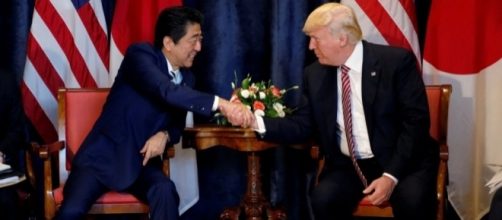U.S. President Donald Trump and Japanese Prime Minister Shinzo Abe have agreed to expand existing sanctions over North Korea. This is to further pressure the belligerent state to halt its development of nuclear capabilities and ballistic missile tests.
What are the existing sanctions imposed on North Korea?
Currently the sanctions on North Korea involve limiting trade, a ban on importation of oil and coal except for livelihood purposes, a ban on exporting metals, which is the primary trade good of North Korea, and an embargo on luxury items. Japan had restricted North Korean vessels access of its waters and banned entry to all Japanese ports.
South Korea had banned trade with North Korea and essentially outlawed the exchange of culture between the two Koreas. Despite these stringent sanctions, North Korea continues to develop its nuclear and ballistic capabilities. This is why Trump and Abe have agreed to send a tougher message to Pyongyang and further limit the resource gathering capability of the rogue nation.
These sanctions are agreed to by the United Nations and are enforced strictly over Pyongyang. However the only chink in this ironclad sanction is China. Beijing doesn't fully place the same stringent sanction over their northern neighbor, mainly because the rogue nation is China's regional ally.
What is North Korea's response to the threat of expanded sanctions?
North Korea continues to threaten the United States with all manner of retaliation. Pyongyang stated through its diplomatic ambassadors to the United Nations that Pyongyang will not cease its nuclear ambition unless all sanctions are lifted completely and the United States leave the Korean peninsula.
In the midst of harsh sanctions, North Korea relies on the cooperation of China and the substantial aid it provides despite the ongoing sanctions. China had been criticized by countries opposed to Kim Jong-Un, especially the United States for continually supporting the hermit state and not aligning with U.S. diplomatic policies against the nuclear ambition of Kim Jong-Un.
However, the U.S. relationship with Beijing is now tested due to the issue over the South China sea; a body labeled as international waters to the United Nations but regarded as Chinese territory by Beijing. The "Freedom of navigation operations" is highly resented by the Chinese government, and especially its military, but the United States continues to impose its policy despite the continued presence of China in the area.
Though Japan and the United States increased the pressure on Pyongyang, without the help of China, nothing substantial will be gained. Only Kim Jong-Un's starving people will feel the brunt of the sanction and only the lowly commoners will starve and die.


